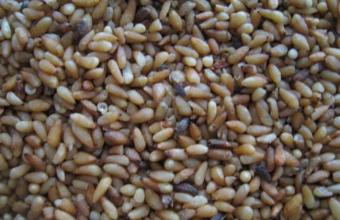Arborvitaes are one of evergreens or shrubs from the Cypress Family (Cupressaceae). Statistics show that there are more than 150 types in the globe, fast-growing or slow-growing species. The most common varieties are American Arborvitae (Thuja occidentalis), Giant Arborvitae (Thuja plicata), Japanese Thuja (Thuja standishii), Chinese arborvitae (Platycladus orientalis), and Green Giant Arborvitae (Thuja standishii x plicata), etc. And they also have a few of different common names respectively, for example, not a cedar at all as it is, American one is called Eastern Arborvitae or Northern Whitecedar.
Also known as biota seed and Bo Zi Ren in Pinyin, it refers to the kernel of Platycladus orientalis (L.) Franco or commonly the seed of Oriental arborvitae and Cacumen Biotae Orientalis. Also, it is one common type of artificial dwarf arborvitae used as landscape trees in China, which frequently grows along walkways. Just like Bonsai, it is cultivated by repeated ruthless pruning, ending up presenting what the planters expect it to be. However, without interfering with their growth in the wild, they grow to 20m high and 1m in diameter.
Arborvitae seeds contain large amount of fatty oils, small amount of essential oil, and saponins. These medicinal seeds are long ovate or oblong in shape, 0.3 to 0.7cm long, and 0.1 to 0.3cm in diameter. The newly harvested herb is yellowish white or light yellow while the old stocks, exudating oil spots, yellowish brown. Kernels are often covered with thinly membranous seed coat, round prismatoidal, and with slightly tapering top and blunt end. The texture is soft, oily, and moist. Cross section is yellowish white, with more endosperm and 2 seed leaves containing rich oil. The odor is lightly scented and the taste is neutral but greasy.
PROPERTY AND INDICATIONS
TCM holds the view that Arborvitae seeds are sweet and neutral in nature and covers meridians of Heart, Kidney, and Large Intestine. Main functions are nourishing heart blood for tranquillization and moistening dryness in intestine for relaxing bowels. Main usages and indications are Insomnia due to deficient dysphoria, severe palpitation, and Constipation causing by intestine dryness. Usual dosage is 6 to 15 grams in decoction.

Arborvitae seeds
RELATED CHINESE HERBAL FORMULAS
(1). Bai Zi Ren Wan, from Tai-Pin Sheng Hui Fang (Peaceful Saint Benefit Prescription), is mainly formulated for physical strain in post-partum women, weak limbs, deficient dysphoria and fidgets, no appetite, and insomnia. Other herbal ingredients are Shu Di Huang (Rehmannia), Fang Feng (Ledebouriella), Huang Qi (Astragalus), Ren Shen (Ginseng), Mai Men Dong (Ophiopogon Tuber), Dang Gui (Dong Quai), Xu Duan (Japanese Teasel Root), Ling Yang Jiao (Antelope Horn), Fu Ling (Poriae), Ze Lan (Bugleweed), Gui Xin (Cinnamomi Cortex), Chuan Xiong (Szechuan Lovage Root), Bai Zhu (Atractylodes (White) Rhizome), Suan Zao Ren (Sour Jujube Seed), Zi Shi Ying (Fluoritum), Fu Zi (Prepared Aconite), and Gan Cao (Licorice Root).
(2). Bai Zi Ren San, from Tai-Pin Sheng Hui Fang (Peaceful Saint Benefit Prescription), tonifies Qi and blood, relieves limbs, invigorates lower waist and feet, and removes dampness in arthritis. Other herbal ingredients are Ba Ji Tian (Morinda Root), Tian Xiong (Radix Aconiti Fischeri), Niu Xi (Achyranthes), Tian Men Dong (Asparagus Tuber), Chuan Jiao (Sichuan Pepper), Tu Si Zi (Chinese Dodder Seeds), Rou Gui (Dried Cinnamon Bark), Shi Nan (Chinese Photinia), Xu Duan, and Dang Gui (Dong Quai).
(3). Bai Zi Ren Tang, from Ji Sheng Fang (Prescriptions for Succouring the Sick), is mainly for liver Qi of deficient cold, fullness in upper flanks, spasm of tendons and veins, pains in lower waist, knee, and lower abdomen, and trismus with cyanotic lips and face. Other herbal ingredients are Bai Shao (White Peony Root), Fang Feng, Fu Shen (Root Poria), Dang Gui, Chuan Xiong, Fu Zi, Xi Xin (Chinese Wild Ginger), Gui Xin (Cinnamomi Cortex), and Gan Cao..

![Diseases, Symptoms, tcm, [tcmwindow.com]](/uploadFile/adImg/2015/11/11/f5cbfcc0-4df5-4646-9b9a-f316651a0199.jpg)





